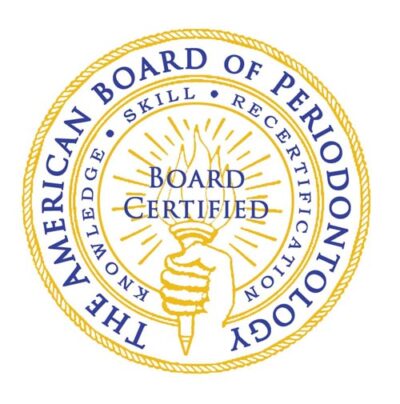Dental hygiene is an important part of overall health. Seeing your dentist regularly is a good way to keep your teeth in good shape so they can last a lifetime. However, sometimes you need a more practiced hand with certain types of dental issues. Periodontists can help with a number of issues that perhaps may be beyond the scope of practice for your family dentist.
What is a Periodontist?
A periodontist is a dental specialist who undergoes additional training to handle advanced cases of gum disease and tooth root issues. With in-depth expertise in oral inflammation, they complete an extra three years of education beyond dental school. They are also skilled in cosmetic periodontal procedures, including dental implants.
Greek Roots of the Word “Periodontist”
A periodontist is mostly concerned with the bone that supports the tooth and the gum tissue surrounding the tooth. When breaking down the word periodontist, in Greek, the word peri means “around” and the word odon means “tooth”. So essentially, a periodontist is a specialist that is concerned with the area around the tooth.
A periodontist deals more with issues of the gum tissue surrounding the tooth and diagnosis and treatment of any underlying conditions with the gums. They use X-rays to help diagnose the tooth health below the gum line and will measure any recession of the gums as well as checking the bite and seeing if any teeth are loose. A thorough health assessment is necessary because of the possibility of corrective surgery that may need to be done to correct a problem. This history will usually be a bit more intensive than a regular dentist due to the nature of their work.
Who Needs to See a Periodontist?
If your dentist suspects that you have advanced periodontal disease, they may refer you to a periodontist. They may also refer you to a specialist if they suspect that you may need surgical intervention for a root or tooth. The goal is that seeing a periodontist will help you keep your natural teeth without the need for implants. However, if the tooth is not salvageable, a periodontist can also help you with implant procedures.
They also treat conditions that are cosmetic in nature. For example, maybe your gums cover a larger portion of your teeth and you would like to have less gum and more tooth. The periodontist can perform what is known as crown lengthening. In this procedure, the periodontist will reshape the gum to expose more of the natural tooth and make the smile less gummy. They will also reshape the underlying bone tissue during this procedure to make the tooth look longer.
Some folks have needs that are beyond the scope of practice for their regular dentist. Bone grafting may be necessary for someone who has had a tooth extraction and the bone where the tooth was has eroded. In this case, the periodontist would go in and graft bone to the site to make it more stable for dental implants. These are just a few examples of the many procedures performed by a periodontist.
If your dentist has recommended a periodontal visit, contact Venice Periodontics and Implant Dentistry for an appointment. Our expert team of dental professionals can’t wait to meet you and give you something great to smile about!







